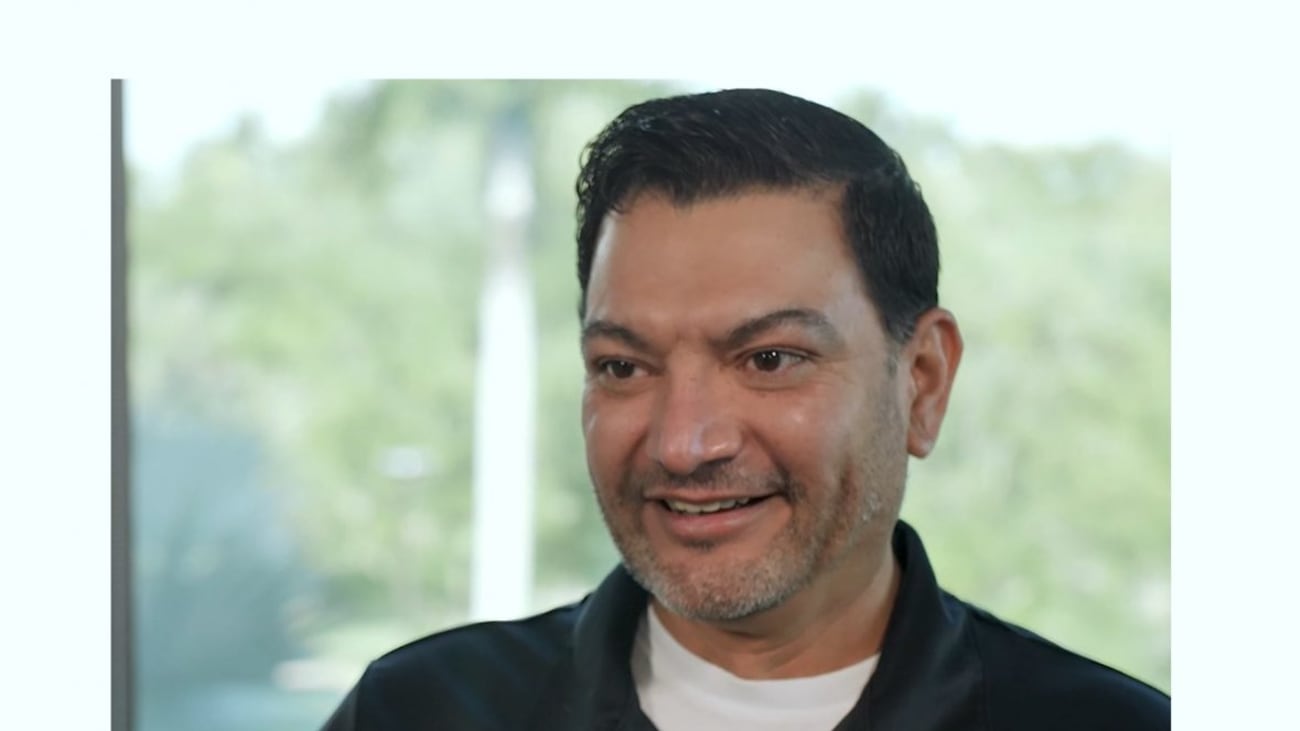

Fred Escobedo remembers feeling surprised when he was told he had throat cancer. After all, he seemed healthy, exercised regularly, didn’t smoke and followed his wife’s vegan diet. When the shock passed, he wondered if he’d live to see his five sons, ages 8 to 17, grow up. Today, after ringing the bell on Jan. 20, 2020, to signify his last cancer treatment at Baptist Health’s Miami Cancer Institute, he shows no signs of cancer and has a good prognosis.
Mr. Escobedo was diagnosed with the most common type of throat cancer ? squamous cell carcinoma. It usually begins in cells on mucosal surfaces, such as those inside the mouth, nose, throat and salivary glands.
“It felt like I had something in my throat,” said the retired military helicopter electrician and now stay-at-home father of five boys. “It was making me cough. It’s like when you are getting over a cold and you are trying to clear your chest.” When the sensation didn’t go away, he got it checked out.
(Watch video: Hear from patient Fred Escobedo and Geoffrey Young, M.D., Ph.D., chief of head and neck surgery at Miami Cancer Institute. Video by Carol Higgins.)
“The good news with this particular type of cancer is that it responds well to treatment, but we have to individualize which treatment is going to be best for the patient in the long run,” said Geoffrey Young, M.D., Ph.D., chief of head and neck surgery at Miami Cancer Institute. The Institute is well prepared and equipped to provide the custom approach to care, bringing together experts for cases like this that may include head and neck surgeons, medical oncologists, radiation oncologists, speech-language pathologists, dental oncologists and others.
“This multidisciplinary approach is very important for this particular disease,” Dr. Young said. “As physicians, we owe it to our patients to look at them not as their disease, but as an individual. And, in the head and neck, we often have different options for treatment.” For Mr. Escobedo, the optimal treatment was chemotherapy and radiation, followed by a minimally invasive procedure called transoral robotic surgery.
Even before he began treatment, however, Mr. Escobedo was offered a unique procedure to help battle a common side effect of radiation. “During an outpatient procedure, we moved one of his salivary glands out of the radiation field and preserved the function of that salivary gland to provide him with a weapon against the severe dry mouth that can often result from radiation,” Dr. Young said. “It’s not something that’s done routinely and not a lot of doctors perform it.”
Not only did Mr. Escobedo acknowledge the convenience of having all of Miami Cancer Institute services in one location, but he also appreciated the care he received from the pain management team, nutritionists and others through the Institute’s Cancer Patient Support Center.
Following chemo and radiation, a small portion of the tumor remained. In a surgery that involved only an overnight stay, Dr. Young used the robot to help reach the hard-to-navigate area at the back of the throat and removed the tumor through Mr. Escobedo’s mouth. “Had this been 10 years ago, before the technology existed, he may have had to have a much bigger operation, even splitting his jaw open. He would have had a feeding tube and been in the hospital a week or two,” Dr. Young said. “We are very, very lucky to have the technology and the skill for patients like Fred.”
While there are different causes for head and neck cancers, Mr. Escobedo’s was associated with the human papillomavirus (HPV). Today there is a vaccine that can prevent many types of HPV that can lead to cancer, yet some 43 million HPV infections were diagnosed in 2018, according to the Centers for Disease Control and Prevention (CDC).
April is Head and Neck Cancer Awareness Month and the team at Miami Cancer Institute would like you to know some of the risk factors for head and neck cancer. In addition to having HPV, you are at increased risk if you smoke or consume high amounts of alcohol, have had prior radiation exposure, eat preserved or salted food, have poor oral health, have been exposed to asbestos and irritants such as wood dust and fibers in the workplace, or if you have had the Epstein-Barr virus.
Symptoms include:
- A lump or sore that does not go away
- A cough or sore throat that lingers
- Difficulty swallowing
- A hoarseness or change in your voice
- Pain in the jaw or behind the ears
- A lump or mass in the neck
Now that treatment is behind him, Mr. Escobedo is ready to get on with life. “When I was told that I was cancer free, it was very emotional,” he said. “Once I retired from the military, I became the primary caretaker for the kids and my wife works outside the home. I feel blessed to have a second chance in life. I would like to see my kids grow up, get older, see my grandkids.”

